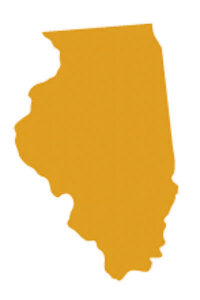According to the National Initiative for Children’s Healthcare Quality, 34.9 percent of children in Illinois are considered overweight or obese (2007 report). This is slightly higher than the national average of 31.6 percent. Among other duties, registered dietitians in Illinois can help parents make better food choices for their children, as well as for themselves.
Initiative for Children’s Healthcare Quality, 34.9 percent of children in Illinois are considered overweight or obese (2007 report). This is slightly higher than the national average of 31.6 percent. Among other duties, registered dietitians in Illinois can help parents make better food choices for their children, as well as for themselves.
In Illinois, registered dietitians are referred to as licensed dietitian nutritionists and are regulated by the Illinois Department of Financial and Professional Regulation. They must meet certain requirements in order to be licensed to practice dietetics and nutrition care in Illinois. Let’s examine the ways in which you can become a licensed, registered dietitian nutritionist in the state of Illinois.
Education and Experience for Registered Dietitians in Illinois
By January 1, 2024, the Commission on Dietetic Registration (CDR), the national organization responsible for setting requirements for registered dietitians, says that all registered dietitians must have a master’s degree. The majority of dietitian education programs are changing in line with this updated requirement.
When choosing an educational program to help you become an Illinois registered, licensed dietitian, you must choose one that has received accreditation from the Accreditation Council for Education in Nutrition and Dietetics (ACEND). The CDR has mandated that all registered dietitians must have a master’s degree, at minimum, by January 1, 2024. Most educational programs for registered dietitians in Illinois and elsewhere are changing to reflect this requirement. (link to Registered Dietitian Schools list – Illinois section) You will find the following types of ACEND-accredited programs within Illinois from which to choose:
Coordinated Program in Dietetics (CP)– A CP gives students an undergraduate or graduate degree in nutrition or a related field. This coursework is integrated with a 1000 hour supervised experiential learning program. As of July 2022, Illinois has 3 CPs.
Graduate Program in Nutrition and Dietetics (GP)- A GP offers coursework integrated with 1000 hours of supervised experiential learning, with the end result being a graduate degree. As of July 2022, Illinois offers 2 GPs.
Didactic Program in Dietetics (DPD)– A DPD is an undergraduate or graduate degree program consisting of just courses. It must be followed by a Dietetic Internship (DI), or a supervised experiential learning program of at least 1000 hours. As of July 2022, there are 12 DPDs in Illinois and 13 DIs.
ACEND-approved dietetic programs in Illinois are available in in-person, online, and hybrid (mixed) formats.
The Illinois Dietitian Nutritionist Practice Act says that in order to be licensed in Illinois, you registered dietitians must have a degree in human nutrition, nutrition education, foods and nutrition, food systems management, or dietetics, along with a minimum of 900 hours of supervised experiential learning. As the CDR’s requirements actually exceed Illinois’, you can easily fulfill Illinois’ licensing requirements.
Sitting for the Commission on Dietetic Registration Examination in Illinois
The next goal that you must meet along the path to becoming a registered, licensed dietitian in Illinois is to pass the CDR’s Registration Examination for Dietitians. Someone from your dietetics program will give you information on how to apply to sit for the exam. You will also be given the Registration Examination for Dietitians Handbook for Candidates to peruse. This is a valuable piece of information with which you should familiarize yourself fully.
Pearson VUE will then issue you an Authorization to Test, valid for one year. Go online to Pearson VUE’s website and select a convenient test center at which to schedule your exam. Pay the exam fee of $200 online as well. Test centers in Illinois can be found in Peoria, Springfield, Davenport, Schaumburg, Buffalo Grove, Chicago, and Rosemont.
Your exam will be between 125 and 145 questions, and is computerized. You will receive your results as soon as you have completed the exam. You need a scaled score of at least 25 in order to pass. Failing the exam requires that you reapply for and receive a Reauthorization to Test, which you can obtain no sooner than 46 days after your failure. Again, this authorization will be valid for one year from the date it was issued. Make sure you have directed the CDR to submit your examination score directly to the Illinois Department of Financial and Professional Regulation.
Licensure of Dietitians in Illinois
About 90 days before you take the CDR exam, Illinois directs its dietitian candidates to complete their Application for Examination/Licensure. The licensure fee of $100 must be enclosed with the application, along with any requested supporting documentation. Mail it to:
Illinois Department of Financial and Professional Regulation
ATTN: Division of Professional Regulation
P.O. Box 7007
Springfield, IL 62791
If you need assistance in completing the application, contact (708) 354-9911.
Your license is renewable on Oct. 31 of odd-numbered years. During each licensure period, you must accumulate 30 continuing education hours. You will be given information on how to renew your license and the renewal fee prior to your first renewal.
Wages for Registered Dietitians in Illinois
The U.S. Bureau of Labor Statistics (BLS) reports that as of May 2021, a total of 2170 dietitians and nutritionists work in Illinois. The annual median wage of registered dietitians in Illinois is $62,920. Those in the top 25th percentile earn an average of $74,660, while those in the top 10 percentile earn an annual median wage of $79,500.
In Illinois, registered dietitians in the Chicago/Naperville/Elgin area earn the highest annual median wages, at $66,440. That is the only metropolitan area in the state in which registered, licensed dietitians earn higher than average wages. Other areas’ wages for dietitians and nutritionists include:
- Carbondale/Marion $61,370
- Champaign/Urbana $60,850
- Northwest Illinois nonmetropolitan area $59,710
- Peoria $59,500





